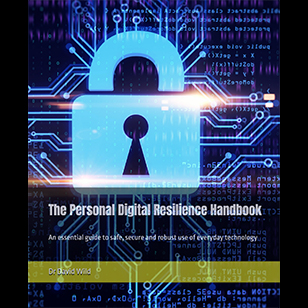
The Personal Digital Resilience Handbook
The COVID-19 pandemic has shown the power of technology to help us lead our daily lives.
From ordering groceries online to smart home devices to working remotely, smartphones, tablets, and computers have become daily necessities. They also come with critical vulnerabilities that can have devastating consequences if attacked. With so much personal information living online, security is more important than ever, and navigating the minefield of the digital world can be a challenge.
“The Personal Digital Resilience Handbook: An essential guide to safe, secure, and robust use of everyday technology,” written by David Wild, a professor of informatics and computing at the Luddy School of Informatics, Computing, and Engineering, aims to provide guidance for users who are focused on ensuring their technology is reliable, robust, secure, private, and under their control. The outbreak of the coronavirus this year inspired Wild to write the book.
“During the early stages of the pandemic, it was very apparent that we were all becoming critically dependent on digital technologies for everything in our lives,” Wild said. “But most people don’t know how to use these technologies in a way that is safe from both malicious attacks and technology failure. What happens if the service you depend on locks you out or goes offline? Or your hard disk fails? Or your kid spills juice on your computer? How do you keep your important data secure? As an informatics and data science professor, I know the risks and vulnerabilities of technology, and ways of mitigating these risks. I really felt a need to help people use technology in a better way.”
Wild, who also is the director of the Crisis Technologies Innovation Lab at the Luddy School, breaks down how to create a digitally resilient computer, how to approach a strong backup system for your information, and how to use the internet and smartphones in the most secure ways possible.
“By making some simple changes how you use technology, you can vastly reduce the chance of something bad happening, such as losing all your files or having your identity stolen,” Wild said.
The final chapter of the book focuses on advanced strategies, such as using off-grid communications hardware and other ways of maximizing privacy.
“These are all things we are starting to actively research in the CTIL,” Wild said. “We’re interested in developing methods for how people can use technology in different ways that are more robust, resilient, private, and secure.”
The Personal Digital Resilience Handbook is available on Amazon and Barnes & Noble.

